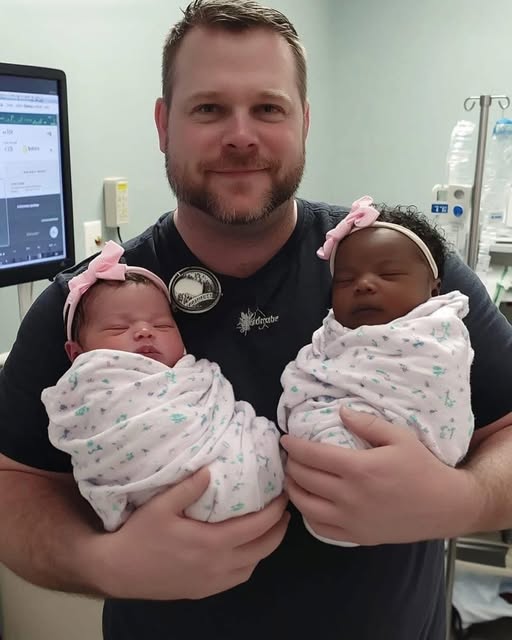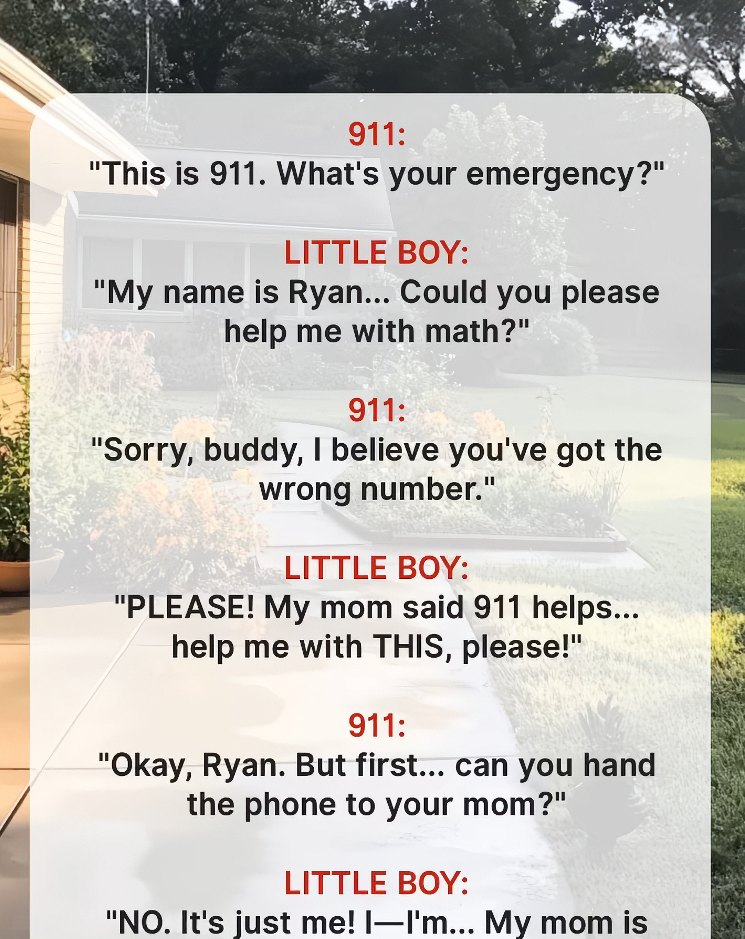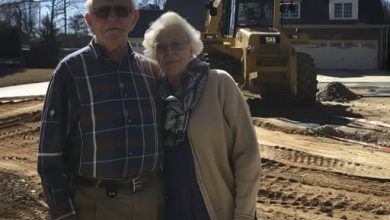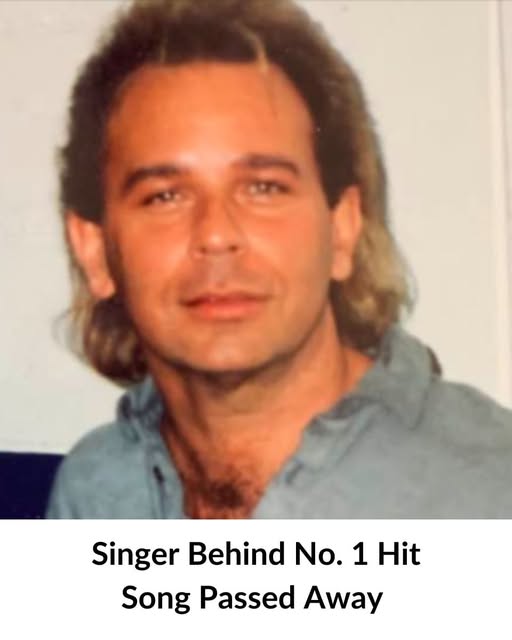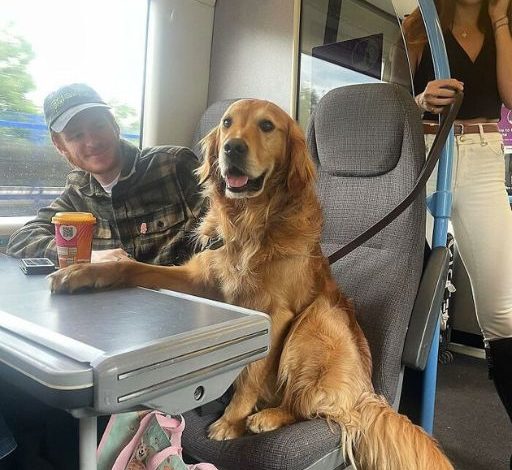
I took the train to clear my head and sat across from a dog that knew too much
I was never meant to be on that train. After a long, tear-stained night spent sitting in my car outside my ex’s apartment, clinging to the idea of going back despite every promise I’d made to myself, I hit a breaking point. On a whim, I booked a last-minute getaway. I didn’t even look at the destination. I just needed to breathe again—to be anywhere else but inside the heartbreak I’d been carrying.
I threw a few things into a bag, bought the first out-of-town ticket I could find, and told myself it was just a break. A shift in scenery. A chance to gather the pieces and remember who I was before I became someone willing to disappear for someone else.
That’s when I saw the dog.
A golden retriever, dignified and serene, sat upright like he belonged more than I did. One paw rested on the table in front of him, his tail curled neatly over the seat. His person was sipping coffee, chatting easily with a woman across the aisle. The dog looked at me—really looked at me. Head tilted, ears up, eyes holding mine. I smiled, unsure why it felt like comfort.
“He’s very social,” the man said, noticing the exchange.
I nodded, still caught in the dog’s gaze. There was something in it—something knowing. As if he recognized I was hanging on by threads, pretending this was just a casual trip, not an escape from something I was too ashamed to admit had broken me.
Then he got up.
Without hesitation, the golden retriever walked across the aisle, rested his head on my leg, and looked up with the calmness of someone who’s seen this before. His person blinked in surprise. “That’s not something he usually does,” he said softly. But the dog didn’t move. His eyes seemed to say, I know. You’re not alone.
I started talking to him—not loudly, not in full sentences, but enough. He listened the way no one had. I told him about the deception. The guilt. The slow erosion of self-respect and the shame of not leaving sooner. And he just stayed there, chin on my leg, tail still.
When we reached the next station, the man leaned over, scratched the dog’s ear, and asked something unexpected. “Would you like to come with us? We’re heading to a small cabin by Lake Crescent. Just for the weekend.”
I blinked. “You don’t even know me.”
He shrugged, unfazed. “Buddy seems to think you’re okay. And you look like someone who needs a little peace. No pressure. No expectations.”
Buddy thumped his tail against my leg, as if to second the invitation. Maybe it was the exhaustion from weeks of crying myself to sleep. Maybe it was the way Buddy looked at me like I was worth saving. Whatever it was, I said yes.
The drive was quiet, filled with easy silences. Sam, the man, told me Buddy had been his constant companion since he lost his wife two years earlier. “He has this way of sensing when someone needs company,” he said with a soft smile. “I guess he decided you do.”
The lake shimmered under the afternoon sun, flanked by towering evergreens that whispered in the wind. The cabin was warm, lived-in, filled with mismatched chairs and the smell of woodsmoke. Buddy stretched out like royalty on the rug while I unpacked slowly, still unsure if I belonged there.
That night, over soup and bread beside the fire, Sam asked gently, “So… what brings you here?”
I hesitated, but his tone held no judgment. So I told him. About a relationship that left me emptied out and invisible. About staying because I thought love meant enduring pain. And about leaving—not out of courage, but because I couldn’t take another day of being forgotten.
He listened without interrupting, then leaned back and said, “Sometimes the bravest thing you can do is walk away.”
Buddy gave a low, quiet bark. Agreement.
The next few days unfolded gently. We wandered beneath moss-covered trees, skipped stones across the lake, shared stories of past lives and lost dreams. Sam spoke of his wife’s laugh, how she teased him for being too serious. I confessed I used to write, and how I stopped when love started costing me my voice.
On the final morning, as I packed to leave, Sam handed me a folded piece of paper. “In case you ever forget,” he said, with a wink.
It was a quote, handwritten in neat print: “Courage doesn’t always roar. Sometimes it’s the quiet voice at the end of the day saying, ‘I will try again tomorrow.’”
Tears filled my eyes. “Thank you,” I whispered.
Buddy barked from the porch, tail wagging as I got into my car. I waved until I couldn’t see them anymore in the rearview mirror.
Home felt different. Not healed, not perfect—but lighter. I started writing again. I walked with purpose. One afternoon, I came across a post from a local animal shelter on social media. There they were—Sam and Buddy, volunteering weekly to comfort others. I knew what I had to do.
I went. The moment I stepped inside, Buddy spotted me and barreled over, tail spinning like a fan. Sam laughed. “We were hoping you’d come back.”
I started volunteering regularly, and somewhere between walking rescue dogs and helping strangers smile again, I found the pieces of myself I thought were lost forever.
Months later, Sam invited me on another retreat—this time to a mountain cabin farther north. I said yes without hesitation. Because sometimes the smallest leap of faith leads you exactly where you’re meant to be.
Looking back now, I know Buddy wasn’t just a dog. He was a gentle guide in golden fur. He taught me that healing begins when we let people in, follow our instincts, and allow space for grace. Life doesn’t demand that we avoid pain. It asks only that we keep showing up for the beauty waiting on the other side of it.
So if you’re lost, heartbroken, or questioning your worth—remember this: sometimes it only takes a kind look, an open door, or a wagging tail to start finding your way home. And maybe that’s all courage ever really is.

